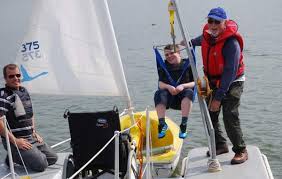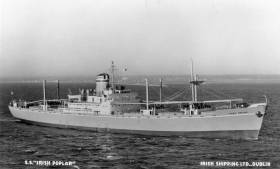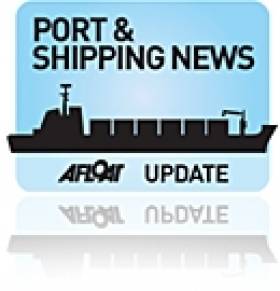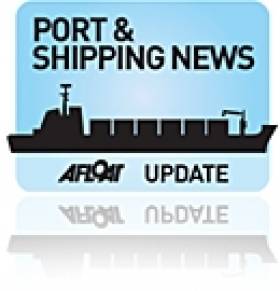Displaying items by tag: Irish Shipping
Des Branigan, Irish Shipping Able Seaman, Dies At 98
#IrishShipping - Tributes have been paid to Irish Shipping veteran Des Branigan, who died recently aged 98, as The Irish Times reports.
The Dubliner was among the first recruits of the Irish Shipping company — merchant sailors who put their lives on the line to maintain Irish imports during the ‘Emergency’ in the early 1940s.
Later, Branigan was active as a trade unionist in the seafaring sector, and as a diving enthusiast he joined the search for the Armada vessel Santa Maria de la Rosa in the 1960s.
He also played a role in the establishment of the National Maritime Museum at the mariners’ church in Dun Laoghaire.
Two years ago, Branigan joined fellow former officers and crew at the 30th anniversary of Irish Shipping’s liquidation, as previously reported on Afloat.ie.
Difficult Waters for Irish Sailing, Just 17,000 Registered Leisure Sailors in Ireland
#irishsailing – There are just 17,000 registered leisure sailors in Ireland at present. There has been a decline in sailing, the level of activity has weakened, clubs are losing membership and several marinas have space available for the first time.
The only official participation figure available is for those 17,000 members of clubs registered with the Irish Sailing Association. There are many more sailors who own boats and use them outside of the club structures, so the actual participation levels could be two or three times that number. But there is no doubt about the decline in activity in the sport. The effects of the economic recession, people having less disposable income, loss of jobs, emigration, have all had their effects.
Brian Craig, one of the Directors of the ISA discusses the challenges facing the sport in a frank and direct interview on the current edition of THIS ISLAND NATION, the niche maritime radio programme, which you can hear here. The interview ranges across the still-present perception of the sport as 'elitist' and the methods needed to change this and to increase involvement in the sport.
"There is still a strong core foundation to the sport," Brian Craig says in the interview which discusses the Strategic Plan the Association has drawn up and which has been considered at meetings of ISA members around the country.

Brian Craig
The plan will be put before the ISA annual general meeting in Portlaoise on March 28 for adoption.
GOVERNMENT THINKS THERE IS AN IRISH LANDBRIDGE!
"We are a funny country. We are surrounded by water. We have a Government that thinks there is a landbridge somewhere, but they don't know where it is."
That was the comment of former seafarer Tom O'Mahony when he spoke to the programme at the annual Remembrance Ceremony for those lost at sea in the town of Youghal on the East Cork coastline. It is a coastal town with a great schooner tradition and memories of seafarers who ranged from the River Blackwater onto the world's oceans in various types of vessels. It is also where the programme is compiled, edited, recorded and transmitted every Monday fortnight at 6.30 p.m. and later each fortnight on Near FM in Dublin, Dundalk FM, Dublin South FM and Raidio Corca Baiscinn in County Clare as well as on this website.
Tom O'Mahony said there was a lack of maritime awareness at Government level and recalled the closure of Irish Shipping and the manner in which ships and crews were stranded overseas and men later left without pensions. "And that was company in which seafarers had gone to sea in ships that would not now pass maritime safety requirements."

DISABLED SAILING
The RNLI describes a very courageous disabled sailor on the programme in contrast to the decision of the Paralympics Committee to discard sailing from its programme.
NO PLACE FOR BEING POSH OR A FIGUREHEAD
Also discussed on THIS ISLAND NATION is the use of nautical descriptions in everyday language, such as 'posh,' being a 'figurehead' and 'flogging a dead horse."
Irish Shipping Crews Reunite 30 Years After Closure
#IrishShipping - Former officers, crew and staff of Irish Shipping gathered at the Conrad Hotel on Friday evening (14 November) for a special reunion 30 years after the liquidation of the company, as The Irish Times reports.
Among those in attendance were Brian Cleare, Brian Boyce, John Boyce and Leo Coy, co-authors of last year's Irish Shipping Ltd: A Fleet History, as well as 96-year-old Des Branigan, one of the company's first recruits who put their lives on the line to keep Ireland supplied during the 'Emergency'.
The anniversary is also time to reflect on Ireland's shipbuilding history, as Jehan Ashmore writes on the tenure of Verolme Cork Dockyard – and the lasting legacy of Irish Shipping, which lives on in name in the form of the Arklow Willow, an echo of the earlier cargo vessel Irish Willow.
Port and Shipping Volumes Show Second Quarter Slowdown
Below is a list of figures for each transport mode based for the second quarter of 2011.
•Lift-on/Lift-off (lo/lo) trades remained static at 0%.
•Roll-on/Roll-off (ro/ro) export traffic was down by 1%.
•Dry bulk volumes increased by 5%,
•Break bulk volumes were down by 6%
•The Tanker/Liquid bulk market was down 6%.
For more in-depth analysis of each freight-transport mode issued by the IMDO and accompanied by graphic charts click HERE.
Remembering Seafarers Who Saved the Nation
City Quay in the centre of Dublin can be a cold place when the wind whips upriver from the open sea.
There was a 'bite' in the wind as I stood there in late November last year, recording the sounds of remembrance. Men, women and children stood in front of a monument where, on most days, traffic pours past and the great majority of people in those vehicles may not realise they are passing a hallowed spot which remembers men without whom this nation would have ground to a halt. This nation may be in a state of "economic war" at present, it was in a real state of war when those men died.
Every year, on the second last Sunday of November, this gathering takes place, when the men of the Irish mercantile marine who lost their lives at sea during the Second World War are remembered. Mass is celebrated in the City Quay Parish Church. Then there is a short walk to the Seamen's Memorial where wreaths are laid. That is followed by tea, coffee and a chat in the parish hall where it is a time of memories for former seafarers and their families. Friendships are renewed as the "family of the sea" gathers. In the afternoon, there is another Memorial Service St. Patrick's Cathedral.
These are poignant occasions which, in recent years, have been extended to embrace, remember and honour all Irish seafarers who have died at sea. The Maritime Institute of Ireland organises the event. Its Cork Branch also holds a remembrance service in November.
The month of November is an important one in the history of Irish maritime affairs.
It was on November 14, 1984 that the then Irish Government, a Fine Gael/Labour Coalition delivered a shattering blow to the Irish maritime industry. They put the national shipping company, Irish Shipping, into liquidation.
Those who took that decision have since put distance between themselves and the maritime sector. Garrett Fitzgerald was Taoiseach; Alan Dukes was the Minister for Finance in the Fine Gael/Labour Coalition Government which made that controversial decision, putting the first Irish State company into liquidation. Seafarers who had rallied to the call to help save the nation when the company was set up in World War Two were abandoned to their fate. Politicians did not want to remember that, at a time when neutral Ireland was being denied vital supplies by warring nations, seafarers saved the nation from disaster. The politicians who ruled the nation in 1984 abandoned them.
Shortly after they abandoned Irish Shipping, the Government was quick to rescue Allied Irish Banks and protect shareholders over the consequences of rash investment in insurance. Banks were more important than seafarers. It seems that not a lot has changed today in the attitude the Government takes towards banks, in comparison with the way it treats the people of this island nation.
• The Annual National Commemoration Services for Irish Seafarers will be held at 11.30 am this Sunday, November 21, in the Church of the Immaculate Heart of Mary, City Quay, Dublin. Wreaths will be laid afterwards at the Irish Seaman's National Memorial on City Quay. There will also be a memorial ceremony of Evensong at 3.15 pm in St. Patrick's Cathedral, Dublin.
• This article is reprinted by permission of the EVENING ECHO newspaper, Cork, where Tom MacSweeney writes maritime columns twice weekly. Evening Echo website: www.eecho.ie
READ MORE ISLAND NATION BLOGS HERE































































